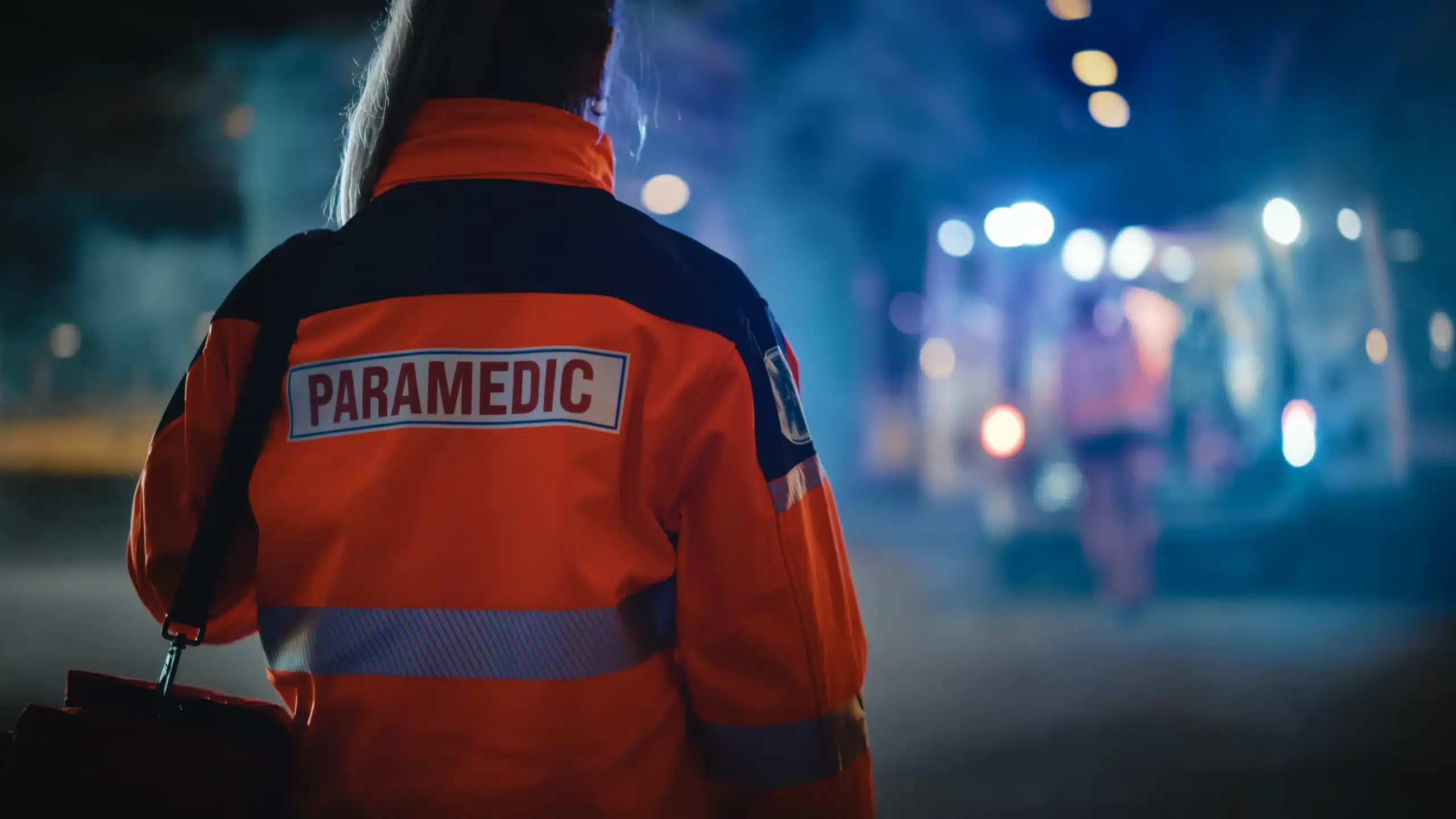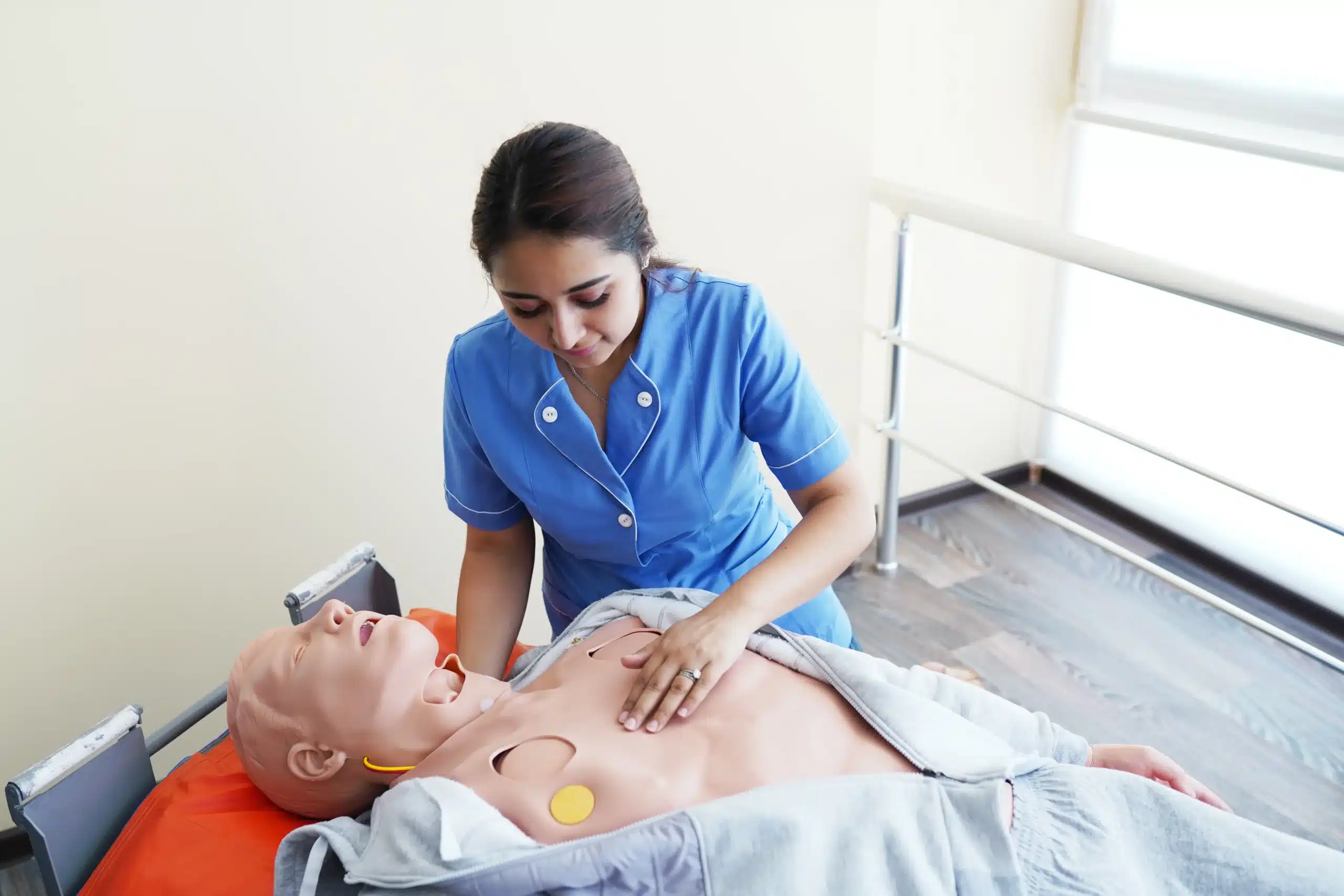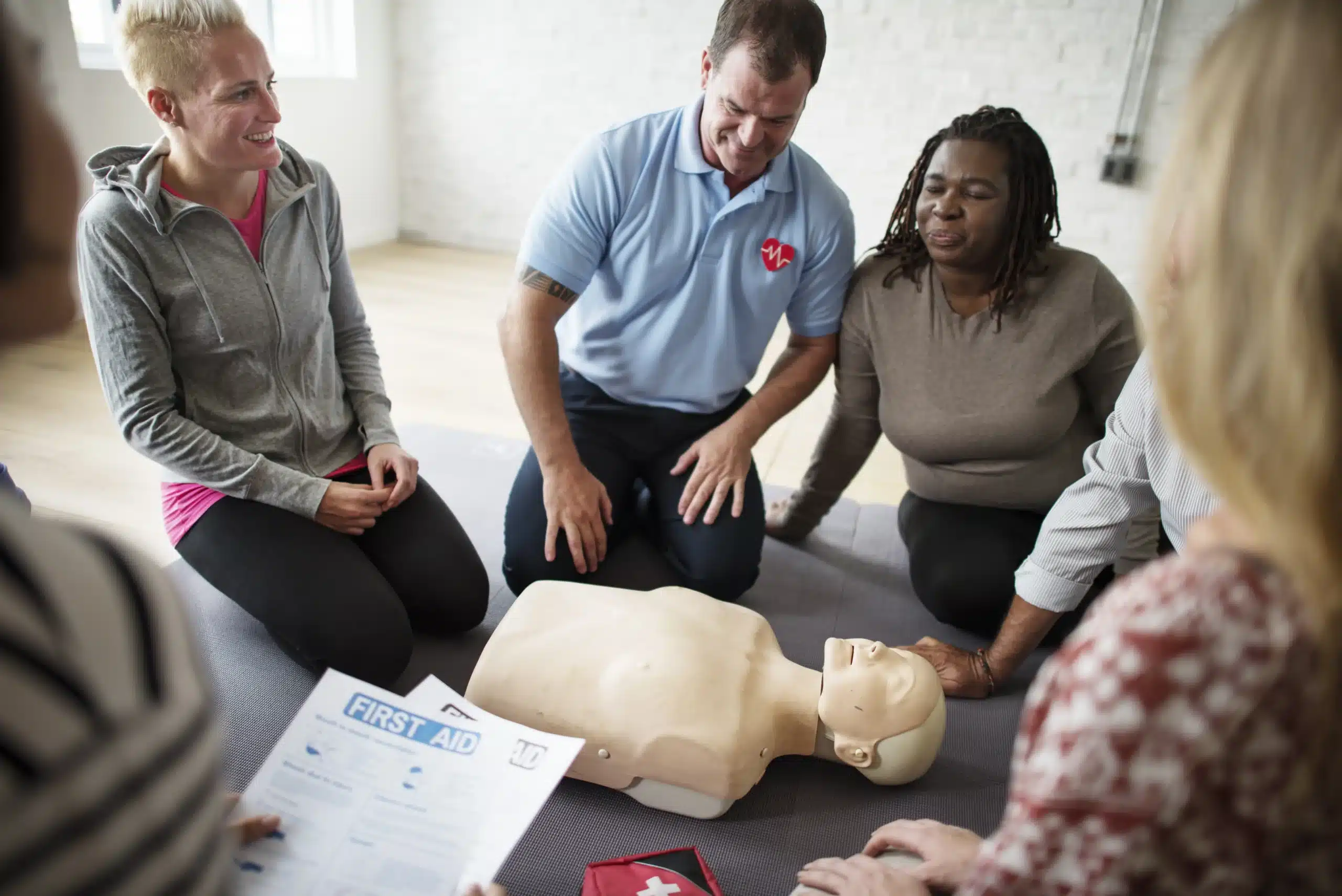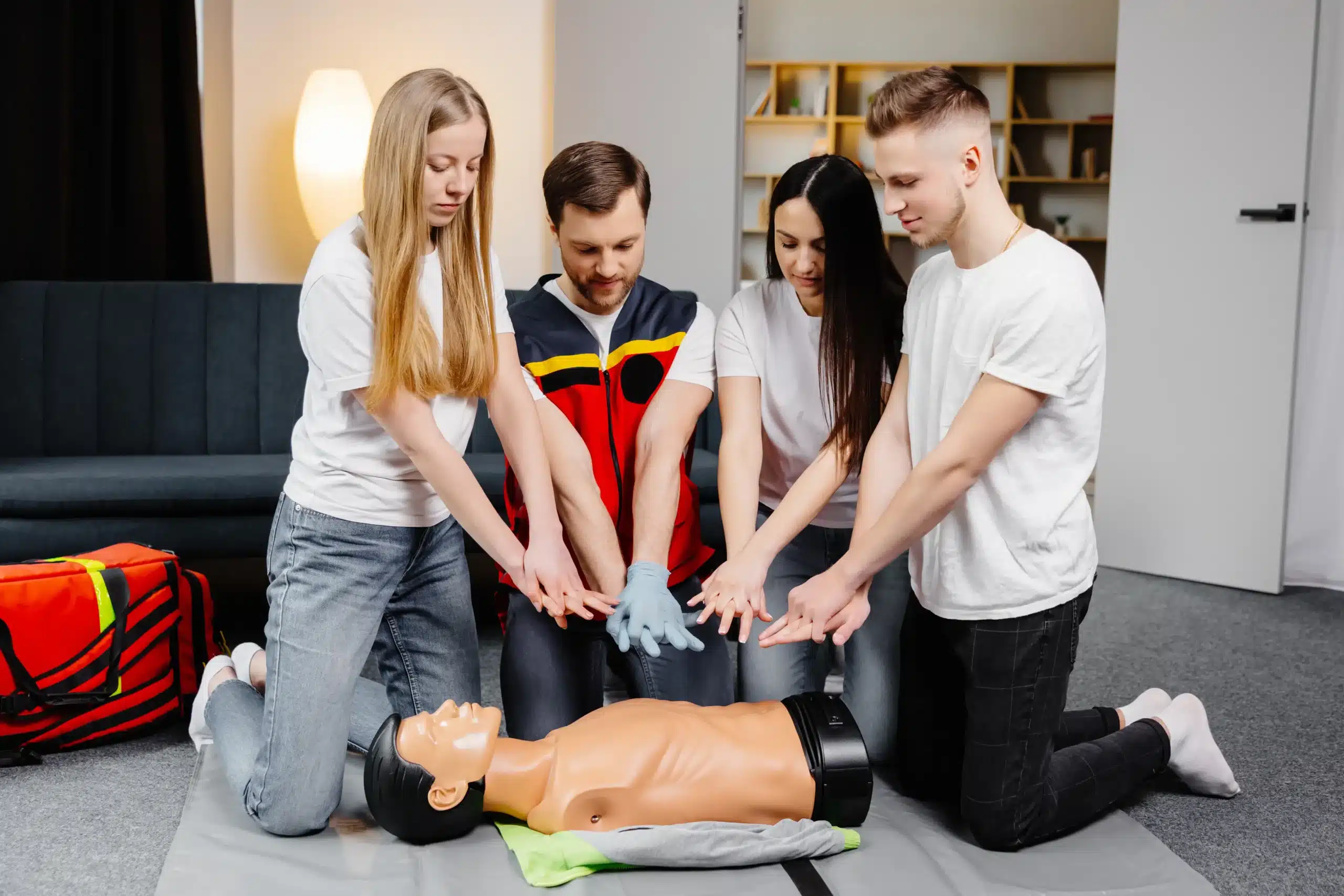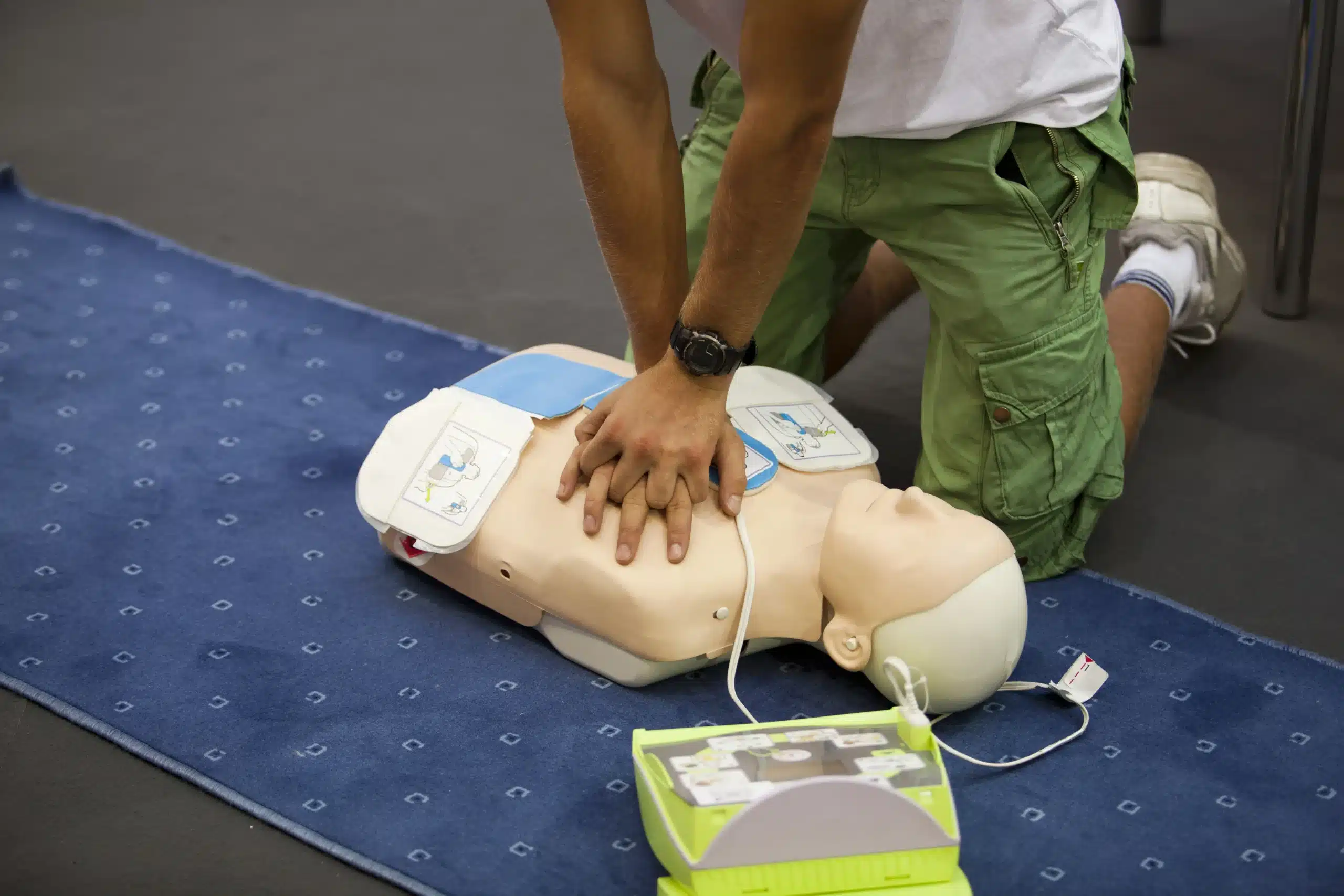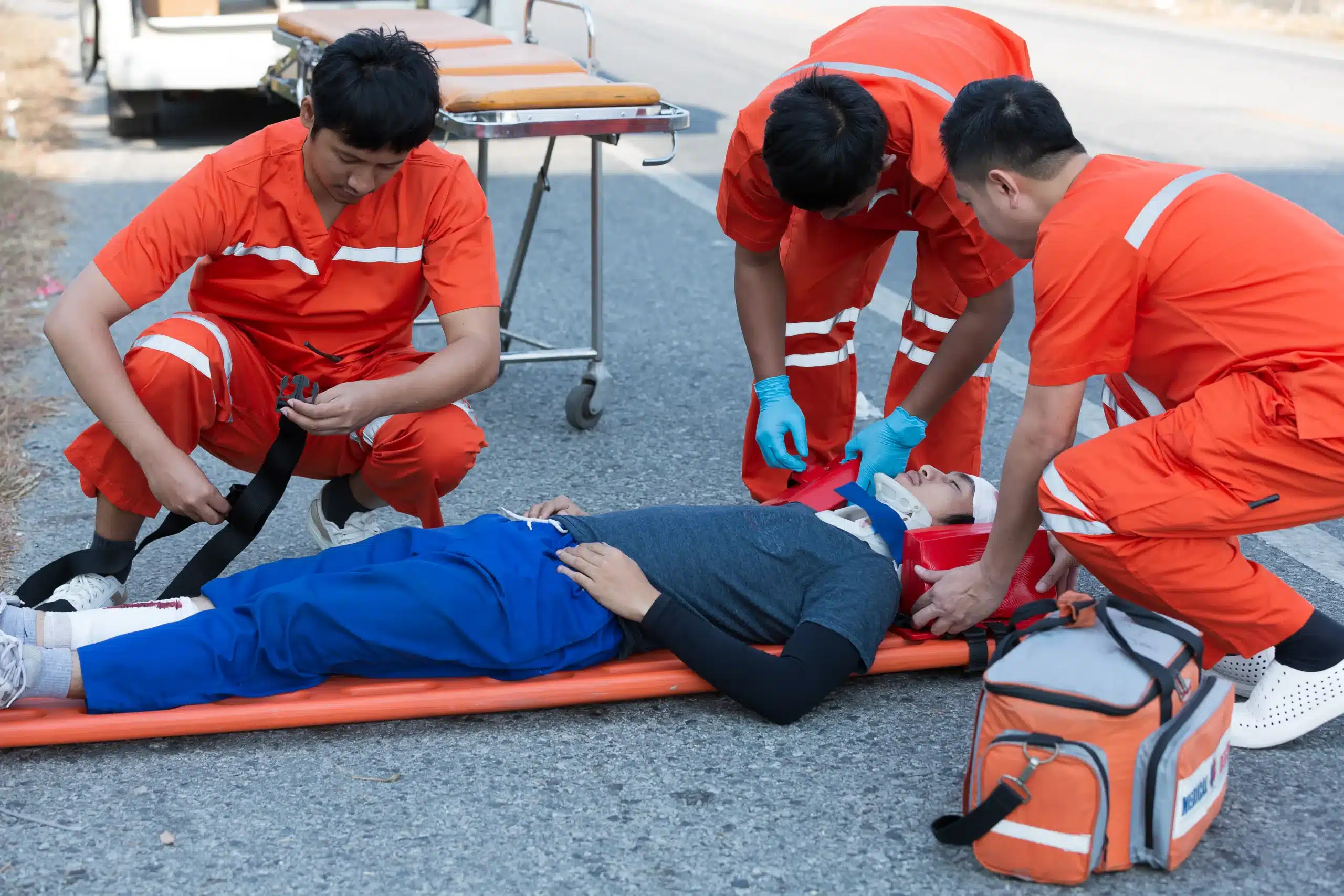Working in healthcare, you understand the importance of specialized training, especially when it comes to caring for children. Pediatric Advanced Life Support (PALS) certification is a vital credential for any healthcare professional working with infants and children. This guide offers a practical roadmap to obtaining pediatric advanced life support in Dublin, California, and the surrounding areas. We’ll cover key aspects of PALS certification, including course content, available formats (in-person, online, and hybrid), costs, and renewal requirements. We’ll also address common challenges faced by healthcare providers during PALS training and offer practical tips for success. Whether you’re a doctor, nurse, paramedic, or other healthcare professional, this guide will provide valuable information to help you on your PALS journey.
Key Takeaways
- PALS equips you with life-saving skills: This specialized training empowers you to confidently manage pediatric emergencies, leading to better outcomes for young patients. Consider different learning formats to find what suits you best.
- Choosing the right PALS course matters: Look for comprehensive training, experienced instructors, and flexible scheduling. Ask providers about their curriculum, instructors, and any available discounts.
- Preparation is key for PALS success: Review pre-course materials, engage actively in simulations, and stay updated on the latest guidelines to maintain your skills and confidence. Continuous learning through continuing education will further enhance your expertise.
What is Pediatric Advanced Life Support (PALS)?
Pediatric Advanced Life Support (PALS) is a specialized program designed to equip healthcare providers with the knowledge and skills necessary to manage critically ill infants and children. The training focuses on a systematic approach to pediatric assessment, rapid identification of life-threatening conditions, and effective interventions to improve patient outcomes. It’s a vital certification for anyone involved in pediatric care, from emergency room staff and paramedics to nurses and pediatricians. For providers in the Dublin, Livermore, and San Ramon areas, Dublin CPR Classes offers convenient and affordable PALS certification options.
Key PALS Training Components
PALS courses blend online learning with hands-on skill sessions. The curriculum covers essential topics, including pediatric assessment, airway management, and vascular access techniques. Participants also receive a BLS review, learn about PALS pharmacology, and practice teamwork through realistic case studies and simulations. The emphasis on high-performance team dynamics ensures that healthcare professionals can work together seamlessly during emergencies. The American Heart Association provides detailed information on PALS course options and curriculum components.
Why PALS is Important for Healthcare Professionals
PALS certification is crucial for any healthcare professional working with children. It empowers them to confidently recognize and respond to life-threatening situations, such as respiratory distress, shock, and cardiopulmonary arrest. By mastering these skills, providers can significantly improve the chances of positive outcomes for their young patients. This specialized training goes beyond basic life support, providing the advanced skills needed to handle the unique challenges of pediatric emergencies. Dublin CPR Classes offers group discounts, making it a cost-effective option for teams seeking PALS certification together.
Find Top PALS Certification Providers in Dublin
Finding the right PALS certification provider is crucial for a positive and effective learning experience. Here are a few options to explore in Dublin, California, and beyond:
Dublin CPR Classes
Dublin CPR Classes is a woman-owned American Heart Association (AHA) Training Center offering high-quality AHA BLS, ACLS, PALS, CPR, and First-aid courses in Dublin, CA. They provide certification courses seven days a week, offering flexibility for busy professionals and students. They are known for their commitment to low prices and excellent customer service. Serving Dublin, Livermore, and San Ramon, they offer group discounts and utilize the AHA’s RQI program for streamlined online recertification. They also offer a BLS course, which is often a prerequisite for PALS.
Code Blue
While not located in Dublin, California, Code Blue offers internationally recognized PALS training in Ireland for healthcare providers facing pediatric emergencies. This intensive course covers assessment, treatment, and teamwork.
SureFire CPR
SureFire CPR provides AHA PALS certification courses designed for healthcare professionals, offering both initial and renewal courses with a focus on convenience and affordability.
Other Local Options
Exploring other training centers and community colleges in your local area can uncover additional PALS certification opportunities. Networking with colleagues and checking with local hospital systems can also provide valuable leads.
Understand PALS Course Structures and Formats
Choosing the right PALS course format depends on your learning style and schedule. Let’s break down the common options: in-person, online, and hybrid. Understanding the differences will help you make the best choice.
In-Person Training
Traditional in-person PALS training provides a structured environment with direct interaction with instructors and peers. These courses typically run for two days and cover comprehensive training for managing pediatric emergencies, including respiratory failure, shock, and cardiac arrest. This format offers immediate feedback and opportunities for collaborative learning. If you thrive in a face-to-face setting and appreciate hands-on guidance, in-person training might be a good fit. Providers like Code Blue offer in-person PALS training in Dublin.
Online and Hybrid Options
For more flexibility, consider online and hybrid PALS courses. Hybrid learning combines online modules with in-person skills sessions. You’ll work through the course material independently at your own pace, then attend a shorter, hands-on session to practice essential skills. The American Heart Association offers information on their PALS course options, including hybrid formats. Fully online options may also be available, allowing you to complete the entire course virtually.
Course Duration and Time Commitment
Understanding the time commitment is crucial when selecting a PALS course. Initial PALS certification takes about 10 hours, while renewals are typically shorter, around 6 hours. Hybrid courses offer a breakdown of time commitment, with the online portion requiring 2–4 hours and a brief in-office skills check lasting 15–30 minutes. SureFire CPR provides details on PALS course durations. Consider your availability and choose a format that fits your schedule.
Hands-on Practice and Simulations
Regardless of format, hands-on practice is critical for PALS training. Simulations provide a safe environment to apply your knowledge and develop crucial skills for responding to pediatric emergencies. The hands-on portion of a hybrid course, or the skills session in a blended learning format, usually lasts around five hours, including breaks. This practice time ensures you gain experience and build confidence. The American Heart Association’s PALS Course Options page offers further details on the hands-on components.
Explore PALS Certification Costs in Dublin
Understanding the cost of PALS certification is a practical first step. Let’s break down the typical expenses you can expect for initial certification, renewal courses, and potential discounts.
Initial Certification Costs
For first-time PALS certification in Dublin, you’ll likely find courses ranging from $205 to $255. This price difference depends on the training center and the specific type of course they offer. It’s always smart to compare a few options before committing. Our Northern CA CPR directory can help you find local providers.
Renewal Course Pricing
If you’re already PALS certified and need to renew, the cost is typically less than initial certification. Expect to pay somewhere between $155 and $160. Again, the exact price may vary slightly based on the provider and course format. Dublin CPR Classes offers convenient online renewal through our RQI classes.
Group Discounts and Special Offers
Training a whole team? Many providers, including Dublin CPR Classes, offer group discounts for PALS certification. This can significantly lower the cost per person and makes coordinating training much simpler. We also offer courses seven days a week to accommodate busy schedules. Contact us to learn more about our low price guarantee.
Prepare for PALS Training: Prerequisites
Before you jump into a Pediatric Advanced Life Support (PALS) course, it’s helpful to understand the prerequisites and what you’ll need to prepare. Getting organized beforehand will make your learning experience much smoother.
BLS Certification Requirement
A current Basic Life Support (BLS) certification is a must-have before starting PALS training. Think of BLS as the foundation upon which PALS builds. It covers essential life-saving techniques crucial for any healthcare provider, especially when dealing with pediatric emergencies. You can often find BLS certification courses through providers like Dublin CPR Classes.
Recommended Experience Levels
PALS is geared towards healthcare professionals like doctors, nurses, paramedics, and others who regularly encounter pediatric emergencies. While prior experience in these situations is helpful, it isn’t a requirement for enrollment. The course is designed to equip you with the necessary knowledge and skills, regardless of your current experience level.
Pre-Course Materials and Study Resources
Most PALS courses provide pre-course materials to help you prepare. This often includes a PALS manual, an online access key for additional resources, a detailed course program, and clear completion criteria. You’ll likely receive these materials after registering for the course. Many providers also offer a pre-course self-assessment, which can help you gauge your current knowledge and identify areas to focus your study efforts.
Know What to Expect During a PALS Course
Getting ready for a PALS course? Understanding the curriculum, format, and assessment methods will help you feel prepared and confident. Here’s a glimpse into what awaits you:
Core Curriculum Topics
PALS courses focus on recognizing and responding to life-threatening emergencies in infants and children. Expect to cover core topics such as identifying respiratory distress and shock, managing cardiac arrest, and understanding early treatment protocols. The curriculum emphasizes a systematic approach to pediatric assessment and intervention, providing a solid framework for managing these critical situations. You’ll learn how to quickly assess a child’s condition, determine the appropriate course of action, and provide effective treatment. This PALS curriculum builds upon the fundamentals of basic life support, adding advanced techniques and strategies specific to pediatric patients.
Simulation Scenarios and Practical Skills
PALS training goes beyond lectures and textbooks. Hands-on practice and simulated scenarios play a crucial role in developing your skills and confidence. These realistic simulations allow you to apply your knowledge in a safe learning environment, working through various emergency situations with instructors and fellow students. You’ll have the opportunity to practice essential skills like airway management, intravenous access, and medication administration, building proficiency and muscle memory for real-world application.
Testing and Evaluation Methods
PALS courses typically involve several assessment methods to ensure you’ve grasped the material and can apply it effectively. Expect a written exam covering the core curriculum, requiring a solid understanding of the concepts and protocols. You’ll also participate in practical skills tests, demonstrating your ability to perform essential procedures like CPR and AED operation. Successfully completing realistic case scenarios is another key component, where you’ll manage simulated emergencies, showcasing your clinical judgment and teamwork skills.
Teamwork and Communication Training
Effective teamwork and communication are paramount in pediatric emergency situations. PALS courses emphasize these crucial skills, teaching you how to collaborate effectively with other healthcare providers. You’ll learn how to clearly communicate patient information, delegate tasks, and work together seamlessly during high-pressure situations. This teamwork training not only enhances your performance in simulated scenarios but also prepares you for real-world collaboration, ultimately improving patient care and outcomes.
Discover the Benefits of PALS Certification
Earning your PALS certification is more than just checking a box; it’s a significant step toward providing the best possible care for young patients. Whether you’re a seasoned healthcare provider or just starting your career,
Career Advancement Opportunities
PALS certification is often a requirement for many healthcare roles involving pediatric care. It signals to employers your dedication to specialized training and your ability to handle pediatric emergencies. Having this PALS certification on your resume can open doors to more advanced positions and increased responsibilities. It demonstrates a commitment to ongoing professional development and a desire to provide a high standard of care, making you a more competitive candidate. Furthermore, PALS training emphasizes teamwork and communication, skills highly valued in any medical setting.
Improved Patient Outcomes
The core purpose of PALS certification is to equip healthcare professionals with the knowledge and skills to manage pediatric emergencies. The course content covers a wide range of critical topics, from recognizing early signs of deterioration to implementing life-saving interventions. This specialized training translates directly to improved patient outcomes. By being able to quickly assess and respond to critical situations, PALS-certified professionals can significantly increase the chances of positive outcomes for young patients facing life-threatening conditions.
Confidence in Pediatric Emergency Situations
Facing a pediatric emergency can be incredibly stressful. PALS certification provides the training and practice necessary to handle these high-pressure situations with confidence. Knowing you have the skills to effectively manage a crisis can reduce anxiety and allow you to focus on providing the best possible care. Reading testimonials from other PALS-certified professionals can offer further insights into the benefits of this specialized training. This confidence also contributes to a more effective and coordinated team response during emergencies, further enhancing patient safety.
Maintain Your PALS Certification
Once you’ve earned your PALS certification, staying current is key to providing the best possible care. This section covers everything you need to know about maintaining your PALS credentials.
Renewal Requirements and Frequency
PALS certification is valid for two years. You’ll need to renew your certification to stay up-to-date on the latest pediatric advanced life support guidelines and practices. This ensures you’re always prepared to handle pediatric emergencies effectively. Check with your certifying organization, such as the American Heart Association, for specific renewal requirements. These requirements may vary slightly depending on your location and specific certification.
Continuing Education Options
Continuing education is a great way to maintain and expand your PALS knowledge. Many organizations offer continuing education (CE) credits for PALS certification. For example, initial PALS courses often provide 10 CE units, while renewal courses typically offer 6. These credits can be valuable for EMS and Board of Nursing professionals looking to fulfill licensing requirements. Providers like SureFire CPR offer CE credits alongside their PALS courses. These opportunities allow you to refine your skills and stay informed about evolving best practices in pediatric care. Explore different CE options to find the best fit for your professional development goals.
Stay Updated with Guideline Changes
Staying current with guideline changes is crucial for delivering high-quality pediatric care. The PALS Provider Course from the American Heart Association focuses on improving outcomes for pediatric patients by preparing healthcare providers to recognize and intervene in critical situations like respiratory emergencies, shock, and cardiopulmonary arrest. Regularly reviewing updated guidelines and incorporating them into your practice ensures you’re always equipped to provide the most effective care. Consider subscribing to newsletters from reputable organizations or following them on social media to stay informed about any updates. This proactive approach will help you maintain the highest standard of care for your young patients.
Choose the Right PALS Course in Dublin
So, you’re ready to commit to a PALS course in Dublin. Great! Choosing the right provider and course structure is essential for a positive and effective learning experience. This section will guide you through key factors to consider and questions to ask potential providers.
Factors to Consider When Selecting a Provider
First, examine the course content. A comprehensive PALS course should cover pediatric assessment, BLS, AED use, airway management, recognizing and treating respiratory distress and shock, and fluid therapy. It should also include managing arrhythmias, cardiac arrest management, post-resuscitation care, and—crucially—teamwork practice. Dublin CPR Classes PALS courses are designed with these core components in mind.
Equally important are the instructors’ qualifications. Experienced healthcare professionals bring real-world insights to the classroom. Ask about the instructors’ backgrounds and certifications. Our team at Dublin CPR Classes consists of certified professionals dedicated to providing high-quality instruction. We also maintain public liability insurance. Finally, confirm the certification’s validity. The American Heart Association certification, which we offer, is widely recognized.
Questions to Ask Before Enrolling
Before you sign up, ask some key questions. First, clarify the eligibility requirements. Some courses may require a current BLS certification. Next, understand the course duration and format. Are you looking for an intensive in-person experience, a blended learning approach, or a fully online option? Knowing the time commitment upfront helps you plan. Dublin CPR Classes offers various course formats. Also, inquire about any pre-course requirements, such as pre-course assessments or required reading. We clearly communicate any preparatory steps. Finally, ask about course fees and any available discounts.
Participant Reviews and Testimonials
Reading reviews and testimonials from past participants offers valuable insights. Look for comments about the quality of instruction, the course materials, and the overall learning experience. Positive feedback often highlights instructors who create a supportive and engaging environment. At Dublin CPR Classes, we’re proud of the positive feedback we receive. Many students share how our courses have increased their confidence in handling pediatric emergencies. Others appreciate our commitment to affordability. We encourage you to check out our testimonials.
Overcome Common PALS Training Challenges
Let’s face it, adding another training to your busy schedule can feel overwhelming. PALS training, while incredibly valuable, comes with its own set of hurdles. But don’t worry, with a little planning and the right approach, you can overcome these challenges and succeed in your PALS certification.
Manage Time Commitments
One of the biggest challenges healthcare providers face is balancing work with the time required for PALS training. Long shifts, unpredictable schedules, and family obligations can make it tough to find time for studying and attending classes. Start by exploring the flexible PALS course options offered by Dublin CPR Classes. They understand the demands on healthcare professionals and offer various schedules to accommodate busy lifestyles. Consider weekend courses, evening classes, or blended learning formats that combine online modules with in-person skills sessions. Planning ahead and coordinating with your employer or family can help you carve out the necessary time for your training.
Handle Content Complexity
PALS covers a lot of complex material, from pediatric-specific anatomy and physiology to advanced life-saving procedures. It’s natural to feel a little intimidated by the volume of information. Break down the content into smaller, manageable chunks. Focus on one topic at a time and use a variety of learning resources, such as textbooks, online videos, and practice quizzes. Dublin CPR Classes provides comprehensive PALS study materials to help you master the curriculum. Don’t hesitate to ask your instructors for clarification on any confusing concepts. Remember, the goal is to build a solid foundation of knowledge and skills.
Apply Skills in Real-Life Scenarios
Bridging the gap between classroom learning and real-world application is crucial for PALS certification. While understanding the concepts is important, being able to apply those skills in a high-pressure emergency situation is essential. PALS courses often incorporate simulations and real-life scenarios to help you develop the confidence to act quickly and effectively. Take full advantage of these opportunities to practice your skills and receive feedback from instructors. Visualize yourself responding to different pediatric emergencies and mentally rehearse the steps involved. The more you practice, the more prepared and confident you’ll feel when faced with a real-life emergency.
Related Articles
- AHA PALS Classes in Dublin – Dublin CPR Classes
- BLS Classes in Livermore: Your Complete Guide – Dublin CPR Classes
- CPR Classes in Livermore: Your Complete Guide – Dublin CPR Classes
- CPR Classes in Dublin: Your Complete Guide – Dublin CPR Classes
- First Aid Certification Dublin CA: A Practical Guide – Dublin CPR Classes
Frequently Asked Questions
What is the difference between PALS and BLS?
BLS (Basic Life Support) teaches fundamental life-saving skills, including CPR and using an AED. PALS (Pediatric Advanced Life Support) builds upon this foundation, focusing on the specialized needs of infants and children in critical situations. PALS delves into advanced techniques for managing pediatric emergencies like respiratory distress, shock, and cardiac arrest.
How long does PALS certification last, and how do I renew it?
PALS certification is typically valid for two years. Renewal involves completing a shorter refresher course, often available online or through a blended learning format. Check with your certifying organization or training provider like Dublin CPR Classes for specific renewal requirements and options.
What if I don’t have any prior experience with pediatric patients?
While prior experience is helpful, it’s not a mandatory prerequisite for PALS certification. The course is designed to equip healthcare providers of all experience levels with the knowledge and skills needed to manage pediatric emergencies. The curriculum covers fundamental concepts and progressively introduces more advanced techniques.
What can I expect during the PALS course?
Expect a mix of interactive lectures, hands-on skill stations, and realistic simulations. You’ll learn how to assess and manage a variety of pediatric emergencies, practice essential skills like airway management and IV access, and work as part of a team to provide effective care.
How much does PALS certification cost, and are there any discounts available?
The cost of PALS certification varies depending on the provider and course format. Initial certification typically costs more than renewal courses. Many providers, including Dublin CPR Classes, offer group discounts, making it a cost-effective option for teams. Check with specific providers for pricing details and available discounts.


